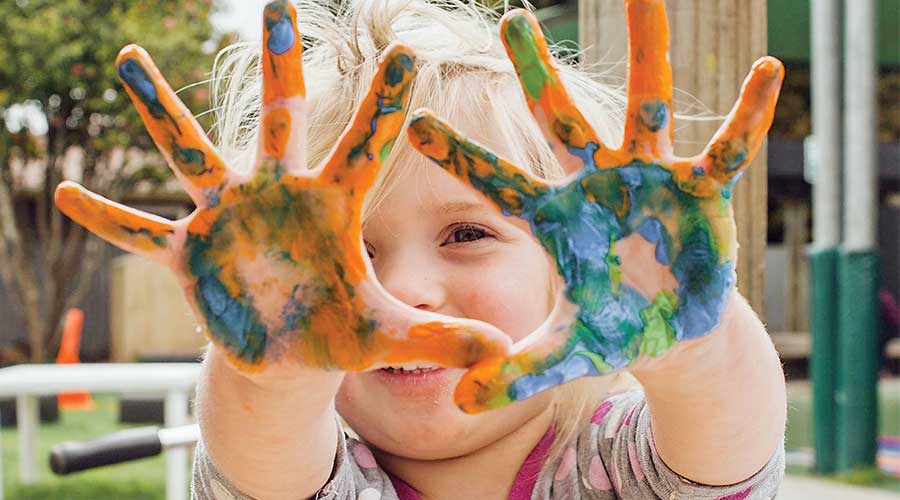Are Your Toddler’s Tantrums Getting Out Of Hand?
- 27 Apr - 03 May, 2024

Encourage cognitive and language development with these fun, everyday learning activities for toddlers.
Try Out Textures
Toddlers are sensory learners who touch, smell, and taste to understand the world around them. Use a dark marker to trace letters and numbers onto poster board. Then have your tot decorate the letters with textured items such as cut-up sandpaper, cotton balls, and pipe cleaners (avoid items that could be choking hazards). Touching the letters gives kids the opportunity to feel the way a letter is formed. For little ones learning to write, their fingers can experiment with the shape of a letter before grasping a writing utensil.
Measure Up
This toddler developmental activity uses everyday items to teach them how to measure. Although a ruler is the most common measuring tool, experiment with other forms of measuring to make the learning process more interesting.
Have your child lie down on the grass and then line up apples next to them to measure how many "apples tall" they are at certain ages. Or determine how many "Legos tall" the couch is or how many "wooden blocks wide" the refrigerator is in your home.
Label Your Household
Pick one or two items to label in your house – such as the refrigerator, windows, and chairs – and rotate the labelled objects every few months. Make labels the same size and use a basic font so kids can identify them easily.
Type, print, and cut out individual words. Then use blue painter's tape (which allows for easy removal) to adhere them to objects. You can also glue the words to index cards and stick them on objects. Labeling allows children to know that everything has a set of common symbols to be written down and identified.
Arrange a Scavenger Hunt
Children are natural investigators and they love to explore. Scavenger hunts can be created beforehand or invented on the spot. At the supermarket, search for foods that are one specific colour (like purple) or look for objects of one shape (like a circle) around the house. If your child needs assistance, gather three objects for them to choose from while asking, "Which object is red? Which object is a circle?"
Introduce Organisation
Nurture your child's helpful spirit by promoting organization in your home. Tie in the "Label Your Household" activity (described above) by keeping toys, clothes, dishes, and household items in specific places. As you put things in their labelled bins and drawers, turn the process into a guessing game.
Ask your child where certain items belong, or place forks in a sock drawer or a toy in the refrigerator and challenge toddlers to fix the mistakes.
Take on the Town
Get familiar with your town by pointing out the supermarket, gas station, and other places of interest. As you pass each place, discuss the details of these neighbourhood staples. This includes who works there, the purpose of your visit, and what items you find inside.
The next time, when you stop by the dry cleaner, ask your child: Do you buy dry clothes or pick up clothes that are cleaned? Who works there, a cleaner or a firefighter?
Sing Vocabulary Words
For this developmental activity for toddlers, create funny tunes about rhyming words and counting to 10, or sing classic songs such as the "Alphabet Song" and "The Itsy Bitsy Spider".
During the pre-reader years, children learn an average of nine new words a day. Parents can support their child's word development by using different words and sounds to enhance their child's expanding vocabulary.
Pin Up Pictures
Keep pictures of friends and family on a bulletin board in your child's room to develop word association and improve memory. Write people's names on sticky notes (include titles such as "aunt", "uncle", and "cousin") and put them at the bottom of each photo.
Refer to the words often, especially at a family gathering. Remove the sticky notes from the pictures as your child becomes more familiar with everyone. Also, read books about brothers and sisters or aunts and uncles, and ask your child to identify each family member mentioned.
Encourage Pretend Play
Toddlers learn about the world around them through pretend play or make-believe. Not only can they emulate some of the adults they see in their lives (like doctors, nurses, firefighters, and police officers), but they also get the opportunity to use their imagination and creativity. Equip your little one with simple clothing to dress up in. Look for basic items around your home like different hats and accessories, or you can purchase an inexpensive doctor's kit or other dress-up items like a chef's hat and apron. As you interact with your little one, let them lead the way. When they're pretending, they will be developing their social skills as well as learning to master basic actions like putting on a hat or pulling an apron over their head.
COMMENTS